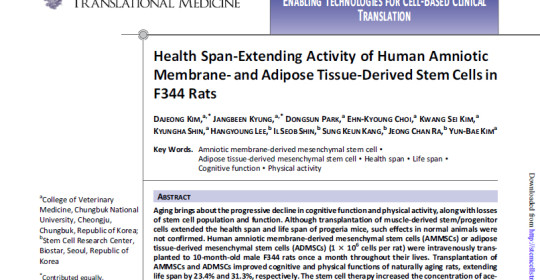
Confirming the possibility of extending human life expectancy to 100 years, with adult stem cells
- Results of joint research by Dr. Kim Yun-bae of Chungbuk National University and Dr. Ra Jeong-chan of Biostar
- Published in the international scientific journal, Stem Cells Translational Medicine (IF 5.7)
- Repeated intravenous injections of adipose-derived stem cells shown to increase the lifespan of rats by 30%
- Substantial increase in the health span including cognitive function and physical vitality
The developed technology is expected to be commercialized globally within 5 years
The results of a study confirming the possibility of extending the health and life spans through intravenous injections of adult stem cells were announced by a domestic research team. This is the result of a joint study conducted by the research teams headed by Professor Kim Yun-bae from Chungbuk National University and Dr. Ra Jeong-chan at the Biostar Stem Cell Research Institute.
On September 27, the Biostar Stem Cell Research Institute, jointly operated by R Bio and Nature Cell, announced that the research results have been published through the Stem Cells Translational Medicine (IF 5.7), an international journal of medicine. This is especially meaningful as it will be published as a featured paper, and be introduced to the general public through a public relations article by the editors of the journal.
The research team administered intravenous injections of a million human adipose-derive stem cells to 10-month-old rats once a month until death. The rats showed improvement of cognitive functions (incl. learning ability and memory) to a level equivalent to that of younger animals, and regeneration of blood vessels in the brain and muscles, which in turn resulted in increased muscle mass and enhanced physical endurance. These effects ultimately led to an increase in longevity by 31.3%. .
The results of the study also showed that the human stem cells administered into the blood vessels migrated into the brain and differentiated into brain cells, thereby activating dopaminergic and cholinergic neurotransmission and enhancing cognitive functions and physical vitality.
Of particular note, this study presented surprising results that stem cells actually contribute to the regeneration of brain cells by eliminating CCL11, a chemokine that inhibits the regeneration of brain tissue, and inducing the regeneration of nestin-positive cells present in the brain.
The research team also examined the longevity-related effects of amniotic stem cells, which were extracted along with adipose-derived stem cells. Amniotic stem cells were found to extend longevity by 23.4% by differentiating into brain cells and becoming involved in the regeneration of brain tissue, based on the same mechanism as that of adipose-derived stem cells.
This serves as evidence that repeated intravenous injections of adipose-derived stem cells and amniotic stem cells, which are adult stem cells, effectively extend health and life spans. These results are expected to lead to the creation of a massive anti-aging market involving the use of autologous stem cells or stem cells of similar types, which caused minimal immunological rejections, and to open a new era of human longevity, with expected average life expectancy of 100 years
Dr. Ra Jeong-chan, the CTO of R Bio and Nature Cell, who co-authored the published research paper, announced the future plans: “We will conduct longevity research on the effects of adult stem cells on the longevity of 10 main types of animal models of aging, in collaboration with world-class research teams specializing in anti-aging, for the next 3 years to extend the health and life spans by over 50% and commercialize the technology within 5 years.”


Leave a reply